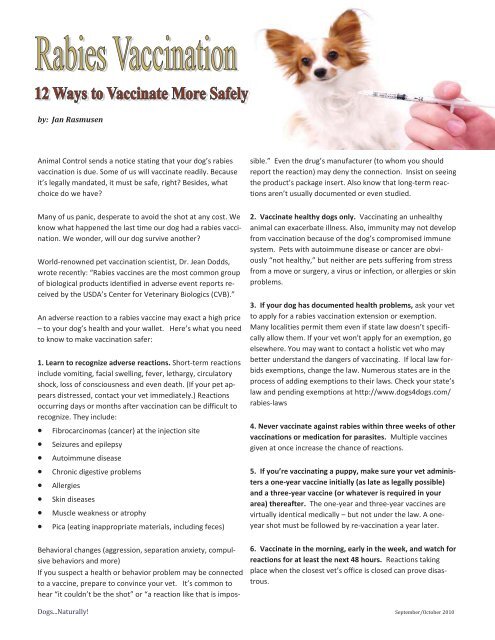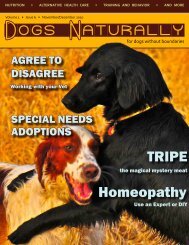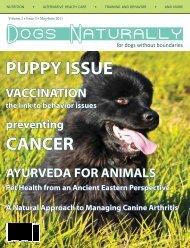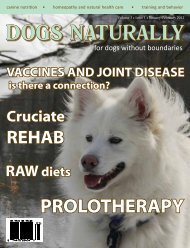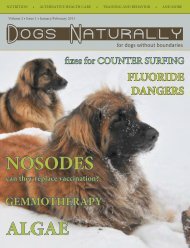September-October201.. - Dogs Naturally Magazine
September-October201.. - Dogs Naturally Magazine
September-October201.. - Dogs Naturally Magazine
Create successful ePaper yourself
Turn your PDF publications into a flip-book with our unique Google optimized e-Paper software.
y: Jan RasmusenAnimal Control sends a notice stating that your dog’s rabiesvaccination is due. Some of us will vaccinate readily. Becauseit’s legally mandated, it must be safe, right? Besides, whatchoice do we have?Behavioral changes (aggression, separation anxiety, compulsivebehaviors and more)If you suspect a health or behavior problem may be connectedto a vaccine, prepare to convince your vet. It’s common tohear “it couldn’t be the shot” or “a reaction like that is impossible.”Even the drug’s manufacturer (to whom you shouldreport the reaction) may deny the connection. Insist on seeingthe product’s package insert. Also know that long-term reactionsaren’t usually documented or even studied.Many of us panic, desperate to avoid the shot at any cost. Weknow what happened the last time our dog had a rabies vaccination.We wonder, will our dog survive another?World-renowned pet vaccination scientist, Dr. Jean Dodds,wrote recently: “Rabies vaccines are the most common groupof biological products identified in adverse event reports receivedby the USDA’s Center for Veterinary Biologics (CVB).”An adverse reaction to a rabies vaccine may exact a high price– to your dog’s health and your wallet. Here’s what you needto know to make vaccination safer:1. Learn to recognize adverse reactions. Short-term reactionsinclude vomiting, facial swelling, fever, lethargy, circulatoryshock, loss of consciousness and even death. (If your pet appearsdistressed, contact your vet immediately.) Reactionsoccurring days or months after vaccination can be difficult torecognize. They include: Fibrocarcinomas (cancer) at the injection site Seizures and epilepsy Autoimmune disease Chronic digestive problems Allergies Skin diseases Muscle weakness or atrophyPica (eating inappropriate materials, including feces)2. Vaccinate healthy dogs only. Vaccinating an unhealthyanimal can exacerbate illness. Also, immunity may not developfrom vaccination because of the dog’s compromised immunesystem. Pets with autoimmune disease or cancer are obviously“not healthy,” but neither are pets suffering from stressfrom a move or surgery, a virus or infection, or allergies or skinproblems.3. If your dog has documented health problems, ask your vetto apply for a rabies vaccination extension or exemption.Many localities permit them even if state law doesn’t specificallyallow them. If your vet won't apply for an exemption, goelsewhere. You may want to contact a holistic vet who maybetter understand the dangers of vaccinating. If local law forbidsexemptions, change the law. Numerous states are in theprocess of adding exemptions to their laws. Check your state’slaw and pending exemptions at http://www.dogs4dogs.com/rabies-laws4. Never vaccinate against rabies within three weeks of othervaccinations or medication for parasites. Multiple vaccinesgiven at once increase the chance of reactions.5. If you’re vaccinating a puppy, make sure your vet administersa one-year vaccine initially (as late as legally possible)and a three-year vaccine (or whatever is required in yourarea) thereafter. The one-year and three-year vaccines arevirtually identical medically – but not under the law. A oneyearshot must be followed by re-vaccination a year later.6. Vaccinate in the morning, early in the week, and watch forreactions for at least the next 48 hours. Reactions takingplace when the closest vet’s office is closed can prove disastrous.<strong>Dogs</strong>...<strong>Naturally</strong>! <strong>September</strong>/October 2010


